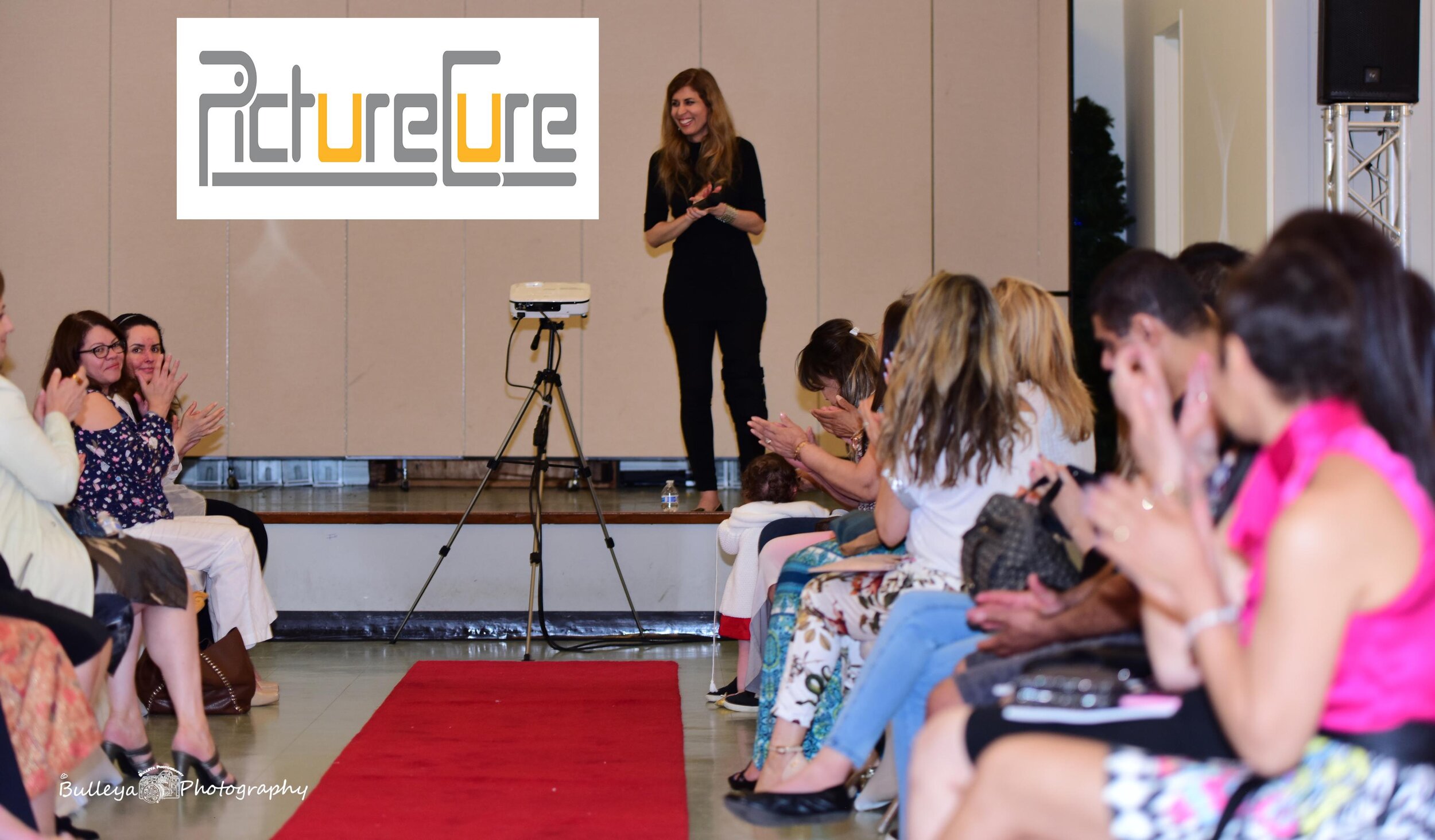There comes a time in everyone's life when we may want to change something or achieve more. Or sometimes, change simply falls on us in the form of a crisis: illness, death of a loved one, divorce, loss of a job.
I'm Liza Andrews, the creator of the PictureCure® methods for personal and professional self-development. You can use this method on your own or in our guided workshops to: improve body language for business, become more photogenic and videogenic, boost self-esteem and overcome stage fright.
Our Methods "How to Become Photogenic" and “Recovery and Reinvention,” are taught in Europe, South America and the United States; in English, Spanish and Portuguese. Our company’s name PictureCure, means “the cure through photography” and we chose it because we believe in the power of images. To wow, to impress and to show what may be wrong or uncomfortable, and can be improved.
Our "How to Become Photogenic" method was created to fulfill this need to change to become your better self, personally or professionally. So we trained individuals both on the moves to become photogenic and the psychology behind being shy and self-conscious about their image. This way, one could represent themselves online through their best images, increasing their chances to get a job, a date, being admitted in a club or institution and much more.
During twenty plus years teaching that method, however, I found out that some individuals who came to us to become photogenic were also experiencing deeper problems. Low self-esteem due to aging, weight problems or constant exposure to a highly critical or biased environment. Those individuals managed to look good in the photos I took of them because I was there encouraging and directing them. Still, they later relayed that they did not obtain the same life-long confidence that most of my clients experienced after our training.
I started studying a way to help them further, but the answer only came years later when I got sick myself. A severe hormonal dysfunction stained my face with aging spots and made me lose hair and weight along with my self-esteem. I looked terrible and despite my best efforts to wear special makeup and a wig, and tailor all my clothes, my boss once asked me to not frequent an important celebration at our company because interacting with clients looking so fragile might no be good for our "brand."
The experience was a wakeup call. We try to dress nicely for work, but assume that what matters most are our degrees, our experience and what we bring to the table. Definitely, substance has a big weight, but access to the best opportunities are highly increased by your wardrobe, personal care, attitude and body language. All the above build your most solid personal brand.
I went through a two-year recovery period that spanned medical treatments to diets and exercises, and I created a method to help me stay on track and overcome that crisis with great results and mental stability. Here's what I did.
Whatever the case is, keep in mind that there are two major aspects to consider when you decide to change something in your life:
The technical part: How to set up your exact goal? Which steps will be necessary to get there. And how do we monitor our results?
And the psychological part: How do we handle our emotions? How do we fight the urge to give up? And how to keep ourselves motivated long enough to see results?
THE RECOVERY & REINVENTION METHOD
While studying Psychology in the University, I lost a great mentor and tried different methods to cope with grief. What actually helped, however, was when a friend offered to teach me how to surf. I was terrified of the ocean and the challenge of taming my fear and reinventing myself as a braver person took my mind out of the grief. The experience also made me feel proud of my efforts and admire my inner strength. That new ammunition encouraged me to engage in new self-improvement projects along my life, and several years later, sick and sorry for myself, it was natural to work on another challenge.
Since this time my problem involved my appearance, I combined the psychological approach I had used in the past, with audio-visual tools (photos, videos and audio memos) to monitor my results.
Once a week, I would photograph my body and face, number the pictures and make a report about what I was seeing in my body as I proceeded with the doctors' recommendations.
I used an actual notebook for the reports, where I would say things like: I gained back weight more rapidly with diet X. Or my hair is falling less after I started using Y.
I would also test different outfits in front of my cameras and then report, "I look less pale in red." "Avoid wearing golden earrings."
The beginning of any changing process is hard and requires a lot of will power. That's when we address the psychological part.
I learned that when your transition will take months or years, you need to look for the small victories. If you are trying to lose weight, in the meantime, find outfits that value your current body type and create a visual illusion that you are already slimmer. In my case, I looked for colors, outfits and even practice the body language that made me look "less sick" or "less pale", until results became more substantial.
Another challenge while monitoring your progress (especially when it comes to physical issues) is not feeling sorry for yourself. You need to create an emotional distance between your image in the photos or videos you are collecting and your inner self. Your body may not be at its best now, but you will improve the physical, as much as your condition allows, through perseverance. Write beside your first images “Day 1” and keep in mind how “Week 10” will look like.
I like to keep the reports very scientific. But we are human and of course, face those rainy Mondays that we just want to give up, eat chocolate and hide under the covers. That's why I decided to implement the voice memos as the emotional journal.
My initial intention using voice memos instead of writing was merely convenience. I was still working and traveling, and somedays were tough, but I could not stop to write. Recording gave me the opportunity to register my days, emotions and challenges, while I was in a cab or walking somewhere. Later, I discovered the hidden benefit of those recordings. Voice memos are an excellent vehicle to start developing a positive conversation with our inner critic!
Some of us tend to be very tough on ourselves. If we make a mistake at work, we may call ourselves stupid. And when we are not looking our best, we exaggerate and go straight to I am old, ugly, or obese, with nothing in between.
I turned voice memos into the official emotional records of this method after realizing that listening to ourselves later was a more powerful experience than reading what we wrote. I have clients who are used to journaling, and when I suggest creating voice memos instead, they claim they hate their recorded voices, or felt stupid talking to themselves.
These are normal challenges and if you feel the same way, all you need to succeed is changing your mind frame. You are not a mad man, talking to yourself. You are deliberately doing a self-analysis exercise, which is part of a self-development program. That simple.
It requires that you talk to the recorder as if you were talking to someone neutral and nonjudgmental, who's extremely interested in your story.
You should record especially how you feel before and after executing the steps of your self-development plan. Be as open and frank as you can.
Voice memos will also help you get things done, be it taking those pictures that make you uncomfortable, staying on a diet or medical treatment, or going to the gym or rehab when you are not in the mood.
In the Technical Part of this method, you will set up your goals, and the steps you need to achieve them. You will also create a calendar and commit to the activities you need to perform within that time frame. The voice memos will help motivate you. Often you will resist before doing a certain step of your plan, only to later find that step was worth it.
Record how you feel when you don't want to do a certain activity. Go ahead and do it anyway, and then record how you feel. As this pattern of resistance-perfoming-the-action-then-feeling-good constantly happens, you will start resisting less and seeing merit in what you are doing.
After I recovered, I volunteered to share this alternative method with cancer survivors and individuals suffering from depression. Their experiences and suggestions perfected the method and over a decade later, our volunteer work has helped about 400 individuals recovering from illness, or suffering from: depression, grief, self-esteem issues, weight problems and body dysmorphia.
This is our contribution to the community and programs are normally offered pro bono through workshops, inspirational talks and a hotline. In some cases, this program can help professionals fight stage phobia, impostor’s syndrome and gain the overall confidence to excel in their current positions or job hunting. In such cases the program can be purchased, combined or not with the “How to Become Photogenic” workshop.
Interested? Please contact us to schedule a call.
*This program does not replace medication or traditional psychotherapy when needed. But when done correctly, it has proven to be is extremely helpful.











